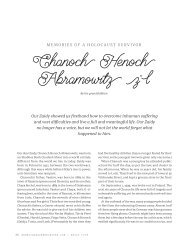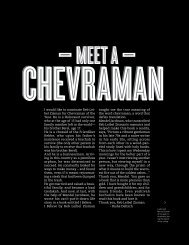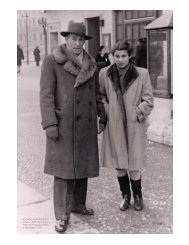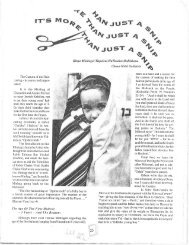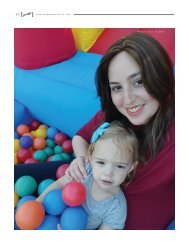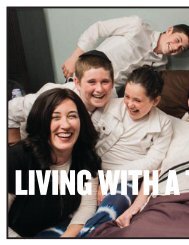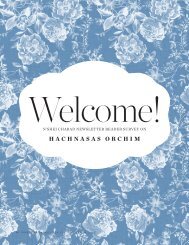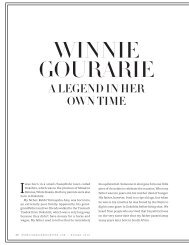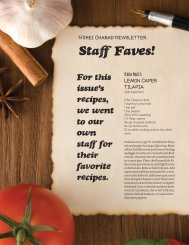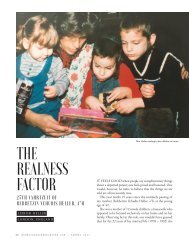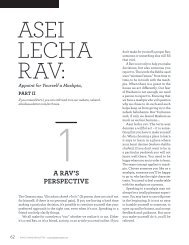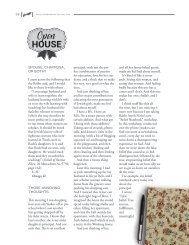Clair 2
You also want an ePaper? Increase the reach of your titles
YUMPU automatically turns print PDFs into web optimized ePapers that Google loves.
Poetry,<br />
Wigs, &<br />
Learning:<br />
The Strands of <strong>Clair</strong>e Grunwald’s Life<br />
AS TOLD TO Nechamie Margolis<br />
SHE CREATES SHEITELS by day and poetry by night,<br />
both forming the fabric of who she is. One of the oldest<br />
names in the wig business, her career as founder of <strong>Clair</strong>e<br />
Accuhair in Brooklyn, New York, has its roots in a DP<br />
camp in Germany when she was 13 years old. She still runs<br />
her successful business today, and during her more than<br />
eight decades of life, she has never stopped questioning,<br />
never stopped learning and growing.<br />
Meet <strong>Clair</strong>e Grunwald, who says, “I’m grateful for the<br />
plenty in this country, but sorrowful that we don’t seem<br />
satisfied or happy.”<br />
Photo: Levi Teitelbaum<br />
42 N’SHEI CHABAD NEWSLETTER | nsheichabadnewsletter.com
DECEMBER 2013<br />
43
Warm<br />
It’s warm; the yard smells of horses and poultry all over<br />
My Aunt Aidele is calling for Andrew the farm hand<br />
He is sleeping under the berry tree<br />
Chickens are walking on his belly<br />
We are giggling and watching behind the bushes<br />
Waiting for Andrew to wake up and sweep corn and chickens off his belly<br />
Aunt Aidele is angry but I spy a smile in the corner of her eye as we kids scatter away<br />
The wheels of time are spinning and spinning like a reel of film<br />
Aunt Aidele and the farm are gone now, but sweet memories of fun<br />
And warmth linger as I peek through a keyhole to my childhood.<br />
Childhood<br />
This is a poem I wrote about the warmest memories of my childhood,<br />
which I spent on my aunt’s farm outside the city of Debrecen, Hungary,<br />
where I was born in 1932. My father’s sister was childless and I was her<br />
little queen when I visited their village in the summer. Even more than I<br />
loved being at home, I loved being there, with the horse, the garden where<br />
we picked our own vegetables, and chicken and geese everywhere. And of<br />
course there was lazy Andrew who loved to sleep under the tree, and never<br />
felt us dropping kernels of corn on his stomach. Watching those chickens<br />
walk over him, gobbling up the corn, was the finest form of entertainment.<br />
I was a lazy child who loved nothing more than to read day and night,<br />
sneaking a book under the table at Shabbos meals when I could get away<br />
with it. We lived directly across the street from school. There were three<br />
bells. When the first one rang, we needed to be in the school building; when<br />
the second rang, in our classroom; and when the third bell rang, sitting at<br />
our desk, arms folded. I jumped out of bed when the second bell rang, and<br />
always made it to class on time.<br />
I loved my five sisters, even though I was considered the ugly duckling<br />
with my red hair and freckles. They were book smart, and I was the dreamer<br />
who never paid attention in school. It didn’t bother me; I just figured you<br />
didn’t have to be smart or pretty to be happy.<br />
I was the third child and when the younger ones had to go to sleep, I<br />
was considered a younger child; when it came time to wash the dishes, I<br />
was old enough to help out.<br />
There wasn’t much entertainment besides reading, and communication<br />
was either in person or through letter writing. My grandmother asked me<br />
to read to her while she sewed or<br />
did other household chores, so my<br />
Hungarian rapidly improved and I<br />
learned to read and write well. Hebrew<br />
was another story. I struggled<br />
with learning Hebrew and each<br />
Shabbos when my mother told me<br />
to read the Shabbos prayers, I read<br />
them in the Hungarian translation.<br />
Suspicious that I finished so fast, my<br />
mother asked if I read every word.<br />
I was able to answer yes in all honesty,<br />
but it didn’t do anything to improve<br />
my Hebrew skills! And that is<br />
why I’m always the last one to finish<br />
davening in shul, even today.<br />
My mother was a strong woman<br />
and we were too similar in temperament<br />
and coloring for me to be her<br />
favorite child. My father was a chossid<br />
of the old Satmar Rebbe but he<br />
never traveled to him on Yom Tov<br />
because the border between Romania<br />
and Hungary was closed.<br />
He was strictly religious and very<br />
chassidish, and we weren’t allowed<br />
to question anything about Yiddishkeit.<br />
I was told G-d was everywhere<br />
and sees everything. I was<br />
petrified of Him and what would<br />
happen to me because of all the<br />
rules I didn’t always keep.<br />
Although my father was tough, I<br />
felt his deep love for us. One of my<br />
favorite memories is singing the<br />
zemiros on Shabbos with him. We<br />
44 N’SHEI CHABAD NEWSLETTER | nsheichabadnewsletter.com
had no boys in our family and all six of us girls sang the zemiros together<br />
with my father. My sister Breindel had a very good voice and my sisters<br />
told me I didn’t sing well. I didn’t care, and sang anyway.<br />
My parents traveled a lot. They went to fairs to buy merchandise to<br />
resell. They bought material to make clothing for the peasants of our city,<br />
and when they traveled, we stayed with the maid. My older sister helped<br />
take care of us all, and my grandfather who lived down the block came<br />
every day to help.<br />
Although we had a live-in maid, it wasn’t like having a maid today. She<br />
mainly took care of the heavy cleaning and laundry that had to be washed<br />
by hand. We only had two bedrooms and we slept two to a bed. The maid<br />
slept in the kitchen. We had a big table built like a box that pulled apart.<br />
The maid kept all her things inside the table, and slept inside there at night.<br />
Debrecen was a big city with a hospital, so we often had family members<br />
In Landau’s<br />
Supermarket<br />
of the patients sleeping in our house.<br />
When we had guests, we gave them<br />
our bed, and slept on blankets on<br />
the floor.<br />
We always had enough to eat, but<br />
there was none of the incredible variety<br />
we see today in the supermarket.<br />
I’m amazed when I see children<br />
asking for electronics and other<br />
expensive gadgets in exchange for<br />
finding the afikomen. I remember<br />
my sister asked for a hard-boiled egg<br />
for finding the afikomen. Jealously,<br />
wistfully, we watched her finish it to<br />
the very last drop. Every Pesach I<br />
tell this story to my grandchildren<br />
and now great-grandchildren. I’m<br />
grateful for the plenty in this country,<br />
but sorrowful that we don’t seem<br />
satisfied or happy. It’s important to<br />
remember the past, and feel hunger<br />
for Torah, instead of luxuries.<br />
At a Brooklyn supermarket<br />
I meander down the aisle.<br />
All is kosher, all is well kept<br />
And I wonder and I smile.<br />
This place is the horn of plenty<br />
In volume and variety<br />
The assortment is uncanny<br />
I shop without anxiety.<br />
The meat section has beef and duck<br />
Chicken and brains and tongue and liver<br />
And flanken and ribs and chuck—<br />
Hashem surely is a Giver!<br />
Here vegetables free of vermin<br />
With a rabbi’s guarantee<br />
Fruits and sodas of every “min”<br />
Cans of tuna, coffee and tea.<br />
Rice cakes, ice cream—ten of a kind!<br />
Large eggs, small eggs and medium<br />
Whatever you seek you can find!<br />
Chocolates and sweets ad nauseum.<br />
As I see my full shopping cart<br />
An old memory comes to mind<br />
Like a vicious stab in my heart<br />
As present and past is combined.<br />
At the Pesach seder way back<br />
In Hungary in ‘44<br />
From my Grandfather with great knack<br />
My sister… with care she did score<br />
Stole the afikomen and then<br />
For the ransom she didn’t beg<br />
A dress, a doll, a fancy pen<br />
She just asked for a hard-boiled egg<br />
And she ate it with decorum<br />
Wistfully, we watched her eat<br />
Finishing, not leaving a crumb<br />
An egg! Those days a kingly treat.<br />
I’m grateful, yet sorrowful<br />
In this land of glut and plenty<br />
With our eyes and stomachs full<br />
Are we satisfied and happy?<br />
Let’s not forget all the lean years.<br />
Remember our vicious foes.<br />
Remember, too, as Moshiach nears<br />
Luxuries, pleasures, won’t eliminate our woes.<br />
We’ll feel hunger for the Torah<br />
So I have heard the scriptures say.<br />
Our souls will dance the hora<br />
How I long to see that day!<br />
DECEMBER 2013<br />
45
Photo: Levi Teitelbaum<br />
War Years<br />
I was twelve years old in 1944 when all the Jews in Debrecen were forced<br />
into a ghetto. Our home was within the ghetto boundaries so my aunt with<br />
her nine children moved in with us. We all slept all over the house on the<br />
floor. Once there was an air raid so we all ran to the basement. When the<br />
all-clear sounded we discovered that not a single bomb had fallen in the<br />
ghetto. So the next time they blew the air raid siren, all the non-Jews ran<br />
into the ghetto!<br />
But then my father was drafted together with all the able-bodied men<br />
to the munkatabor, the forced labor division of the Hungarian army. The<br />
women and children and the remaining men were all herded into a brick<br />
factory, where we slept on the floor without pillows or blankets for the next<br />
two weeks.<br />
The Germans next herded us into cattle cars, 80 people to a car. For<br />
five days, the train meandered between Poland and Hungary. My family<br />
was lucky enough to have secured a place under one of the high windows.<br />
While others moaned and groaned below, I stood on top of a pile of packages,<br />
looking out the window. Debrecen lies on the plains. I’d never seen a<br />
mountain in my life till then, and enjoyed the view and beautiful sunsets.<br />
Although there was hunger and thirst and the embarrassment of eliminating<br />
in front of other people, I was mesmerized by that gorgeous view!<br />
We didn’t know at that time why our train turned away from Auschwitz<br />
at the last moment and went to Strasshof. Only later did we discover the<br />
feverish negotiations between Adolph Eichmann, ym”s, and the Jewish<br />
leadership in Budapest which resulted in our life-saving detour.<br />
When we first boarded the cattle cars, they made an announcement<br />
that elderly people and big families with a lot of children should go into<br />
one group, and smaller families into another. My aunt urged my mother<br />
to sneak into the group of smaller families.<br />
“They probably have better working<br />
conditions for smaller families,”<br />
she said.<br />
“I’m not going anywhere,” said<br />
my mother. “I go where Hashem<br />
leads me.”<br />
That emunah in Hashem served<br />
us well. The transport with smaller<br />
families went straight to the ovens.<br />
Our transport was diverted to Strasshof.<br />
It was no picnic, but there were<br />
no gas chambers there.<br />
When we first arrived, we were<br />
stripped of all our clothes and left<br />
that way all day until we were deloused.<br />
The Germans ordered the<br />
most religious-looking man to carry<br />
things in and out of the area all day,<br />
to add to our humiliation and shame.<br />
Strasshof was surrounded by a<br />
big forest and it wasn’t difficult to<br />
go through the fence. There was<br />
a man in our camp who knew all<br />
about mushrooms and which ones<br />
were poisonous. Those mushrooms<br />
he found for us probably saved our<br />
lives, but it was many, many years<br />
before I could look another mushroom<br />
in the face.<br />
Strasshof was a transient lager,<br />
and one day a few of us were chosen<br />
to pick peas on a nearby farm. We<br />
were lucky, because on the farm we<br />
could get food. My clearest memory<br />
was the lunch the farmer gave us<br />
on a certain day. It was hot potatoes<br />
spread thickly with butter. I didn’t<br />
eat it. I had just turned twelve and it<br />
was a fast day, so although I was so<br />
hungry I didn’t eat. I regretted it later<br />
whenever I thought of that lunch of<br />
potatoes and butter. Even today, I can<br />
still picture that lunch I didn’t eat.<br />
The farm work lasted a very short<br />
while. My mother, my sisters, my<br />
cousins, and I were taken to work<br />
in Mosbirbaum, an oil refinery. We<br />
slept in a big room filled with triple<br />
bunk beds. My family arrived first<br />
and took the three corners, the best<br />
beds in the room, with the most<br />
privacy. Another transport of Jews<br />
soon arrived, assimilated Hungarians<br />
who mocked us for being frum<br />
and hated us for taking the best<br />
46 N’SHEI CHABAD NEWSLETTER | nsheichabadnewsletter.com
places in the room.<br />
At night I talked to my assimilated, “enlightened,” roommates. I loved<br />
logic and my sixth-grade education and my sheltered home environment<br />
didn’t prepare me to answer the unanswerable questions. My new atheist<br />
acquaintances filled my mind with ideas like the Big Bang. “Moses was a<br />
very smart man and wrote the Torah himself,” they said.<br />
When I talked about G-d they laughed at me. “Are you crazy?” they said.<br />
“A loving, all-powerful G-d would let you come here?”<br />
I’d been asking myself the same question.<br />
Yet, I couldn’t completely believe in either theology. I struggled with emunah<br />
but I couldn’t not believe in Hashem<br />
the way I was taught. I continued to<br />
observe all my obligations but resentfully.<br />
It took years before I could<br />
reconcile all the questions and theories<br />
I grappled with. Luckily, I started<br />
studying Torah later in life with Rabbi<br />
Shimon Kessin, a follower of Luzzato.<br />
After years of studying I began to appreciate<br />
creation and my place in it.<br />
The Greatest<br />
Architect<br />
How intricate, elegant, and precise<br />
And complicated is this universe of ours!<br />
Each molecule, each grain of sand<br />
Organized exactly where to stand and bend.<br />
According to an awesome super design<br />
Where balance, logic, and beauty intertwine<br />
Nothing is random, nothing’s out of place<br />
The structure of the atom, the might of the human race.<br />
And the countless species within seas so deep<br />
The smoking volcano, the tallest mountain peak<br />
The snowflakes each different, no two of them alike<br />
Yet, becoming one glowing blanket, as each of them alight.<br />
The structure of the planets as they orbit the sun<br />
The conception of a creature as new life is begun<br />
Could all this exist by chance, without a supreme Hand?<br />
According to new science it all started with “The Big Bang”<br />
All this built at random? Without any plan?<br />
Then abandoned, in one lump, flora, fauna, and man.<br />
Friend, never believe it. For the thought is callous<br />
To maintain Creation, Hashem is always with us<br />
The construction is ongoing, the blueprint is the Torah<br />
Perfection is His desire, the goal is olom haba<br />
Look around you, and observe, miracles without end<br />
The majesty of creation is not just “The Big Bang”!<br />
Nature, science and the Torah embodied in one<br />
Only by Hashem alone can all these things be done<br />
Mercy, love, and beauty are His holy ways<br />
May we see the redemption by Moshiach speedily in our days!<br />
Amen.<br />
DECEMBER 2013<br />
47
Liberation<br />
A year after we were deported to Strasshof, we were loaded together with<br />
the other Jews from Debrecen on trains headed to Theresienstadt. We<br />
settled into the train and only a short while later, the Russians blew up the<br />
tracks, so we returned to Strasshof. This saved our lives.<br />
Two weeks later, the Russians liberated Strasshof. They were almost as<br />
bad as the Germans. They violated our women and because we didn’t speak<br />
or understand Russian, they treated us as if we were the enemy.<br />
With a lot of difficulty and hardships, we made our way to Budapest.<br />
People stared when they saw my old grandparents and us little children.<br />
“Old people, children? Where were you?”<br />
That’s when we found out about Auschwitz and the atrocities committed<br />
there.<br />
We met someone from Debrecen who told my aunt, “Your husband is<br />
home and he fixed up a beautiful apartment for you.”<br />
“What about my husband?” my mother asked.<br />
“He’s not home yet,” the man replied.<br />
I went outside and cried. I knew instinctively that my father was dead.<br />
Back in Debrecen, my mother went to meet every train that came in,<br />
looking for her husband.<br />
On Yom Kippur, she was crying in shul when a woman approached her.<br />
“You know already?”<br />
“Know what?”<br />
“That your Yossel is dead. Isn’t that why you’re crying?”<br />
It turns out that everyone knew but nobody had the heart to tell my<br />
mother. He had perished from starvation. As a devout chossid and talmid<br />
chacham, he had refused to eat treif food, and at the end, he had no reserves.<br />
My father and my sister Goldie, a year younger than me, perished in the<br />
Holocaust; the rest of us girls and my mother survived.<br />
My mother was a strong woman. After this terrible blow she decided to<br />
bring the family to America, where my father’s sister Sara lived. We would<br />
depart from Budapest. I was 13 years old and living in a hachsharah at<br />
Photo: Levi Teitelbaum<br />
the time- a Mizrachi training center<br />
where they prepared us to make<br />
aliyah to Israel.<br />
I wasn’t an easy child and my<br />
mother knew I would refuse to come<br />
with them to America. So she sent a<br />
message to me to come to Budapest<br />
to see the family and then I would<br />
make aliyah. I sold my blanket and<br />
made my way to Budapest, arriving<br />
before my family did. Budapest was<br />
bombed, with very little electricity<br />
and running water and I soon became<br />
ill, and lay in the hospital hungry<br />
and miserable, all alone. Then<br />
one day my sister showed up, carrying<br />
griven and potatoes, chicken<br />
and liver. Emotionally overcome, I<br />
decided at that moment, I don’t care<br />
where they go, I’ll never leave the<br />
family. So I accompanied them as<br />
they illegally crossed the border into<br />
Germany where we waited for visas<br />
to America. We lived in a D.P. camp<br />
in Fuerth, Germany.<br />
I was 13 years old and spent my<br />
days doing nothing. There were very<br />
few children in the camp as most<br />
hadn’t survived. The few children<br />
there were children who had been<br />
hidden for the six years of the war;<br />
they had not been going to school<br />
and so knew next to nothing. I came<br />
from a home where I read Shakespeare<br />
and all that high-falutin’ stuff<br />
and I couldn’t sit for hours with children<br />
just learning to read and write.<br />
My aunt, who had immigrated to<br />
America years before, wrote to my<br />
mother that there were no sheitel<br />
machers in America and it would<br />
be good if one of us sisters learned<br />
the trade. There was an opening<br />
for an apprentice in a gentile hair<br />
salon in Nuremberg, which was an<br />
hour away by train. I was artistic<br />
and good with my hands and my<br />
mother sent me as an apprentice.<br />
I resented it very much as I had to<br />
wake up early and I missed lunch<br />
which was the main meal of the day,<br />
but little did I know how much this<br />
apprenticeship would affect the path<br />
I took in life.<br />
For three years I learned every-<br />
48 N’SHEI CHABAD NEWSLETTER | nsheichabadnewsletter.com
thing about the wig making business,<br />
from processing raw hair to<br />
making a complete wig.<br />
When we finally got our visas to<br />
America four years later in 1949,<br />
my aunt, Sara Merling, took me to<br />
her wigmaker, Madame Marie on<br />
Fifth Avenue in New York City. She<br />
immediately offered me a job, and<br />
I was employed only a week after<br />
arriving in America.<br />
America and Marriage<br />
After arriving in America, all I<br />
wanted to do was fall in love and get<br />
married. I didn’t want a typical shidduch<br />
and together with my friends I<br />
walked to the FDR Drive on Friday<br />
nights where the boys congregated.<br />
Most of them were survivors and I<br />
found a few dates that way.<br />
“In America you’re an old maid if<br />
you’re not married by 20,” my aunt<br />
Sara told me. I was already 19, so<br />
the pressure was on. Sara tried to<br />
trick me into a shidduch. She sent<br />
her daughter Naomi to fetch me.<br />
“Mama wants to go shopping<br />
with you. Get dressed quickly,” she<br />
told me.<br />
When I got to her house, there<br />
was some guy sitting in her living<br />
room talking about the Holocaust.<br />
I didn’t want to talk about that. So I<br />
changed the topic. He listened politely<br />
and after a moment went right<br />
back to talking about the Holocaust.<br />
Picking up a comic book from the<br />
table I read quietly until he got the<br />
message and left.<br />
After a while I had enough. The<br />
boys I liked didn’t like me. If I didn’t<br />
have a date, my friends felt sorry for<br />
me. If I had a date and he didn’t ask<br />
me out again, then I felt terrible. And<br />
if I dated at all, my mother wouldn’t<br />
speak to me for three days because<br />
she felt the boys weren’t religious<br />
enough.<br />
“Mama, I’m ready for a shidduch<br />
date,” I said.<br />
Delighted, she found someone for<br />
me. But my mother had such a good<br />
time talking with him when he came<br />
to pick me up, she forgot to walk out.<br />
He wanted to take me to the movies, but we couldn’t leave because of my<br />
mother. He never came back.<br />
Next, my mother found Moishe Grunwald. He was a grandchild of the<br />
Arugas Habosem and the nephew of the Tzelemer Rebbe, a big family from<br />
Tzecho that was sometimes Czechoslovakia, sometimes Poland. Moishe’s<br />
maternal grandfather was the mayor of the city.<br />
“Mama, this time don’t sit there like he’s coming to see you,” I told my<br />
mother.<br />
Moishe was very quiet. I talked and talked and talked.<br />
“How do you like the boy?” Aunt Sara asked.<br />
“Aunt Sara, he doesn’t say a word,” I complained.<br />
“Oy, your uncle Shaya likes to talk a lot and I love to talk a lot. You will<br />
be so happy if you marry a man who lets you talk!” said Aunt Sara.<br />
After three months of dating, Moishe was too shy to pop the question<br />
as we sat on a bench in the park.<br />
“What do you think of the future?” he said.<br />
“The future? I hope to go boating in Central Park.”<br />
“No, not that future,” he said nervously.<br />
“You want to propose marriage?” I asked.<br />
“Yes!”<br />
“So ask for my hand!”<br />
Moishe asked and I accepted. I waited three or four days before telling<br />
my family the news because they had tortured me so much about not being<br />
married.<br />
Moishe later told me he had loved me at first sight. And after almost 61<br />
years of marriage, I still do most of the talking.<br />
Breakfast<br />
Thoughts<br />
We are having breakfast and my thoughts meander<br />
Looking at my beloved, and my thoughts are tender.<br />
And I’m thinking: Oh! What could be on his mind?<br />
As his breakfast he eats, what thoughts would I there find?<br />
Wed over fifty years, quietly we sit there.<br />
His eyes are far away, mine are on him with care.<br />
And as I sit and think, years of past come to mind.<br />
With kindness, peace or strife; all that is left far behind.<br />
So we quietly eat with our own thoughts busy.<br />
What could be on his mind? The answer is easy.<br />
Nothing complicated, the man has no guile.<br />
His thoughts must be of me… and I give him a smile.<br />
And his sweet face brightens, gratefully his eyes shine.<br />
And I thank Hashem for making this man all mine.<br />
DECEMBER 2013<br />
49
Clockwise from top left: 1) Top row, L-R: <strong>Clair</strong>e, sister Breindu. Second row, L-R: Sister Binu, mother<br />
Rochel Leah, sister Chanie. This photo was taken in 1947. 2) <strong>Clair</strong>e with oldest daughter Chaya Goldish.<br />
3) <strong>Clair</strong>e and daughters, rehearsing for a musical comedy for tzedakah. L-R: Silky Pitterman, <strong>Clair</strong>e<br />
Grunwald, Chanie Handler, Chaya Goldish. 4) <strong>Clair</strong>e teaching children about wigs on Career Day in<br />
Bais Yaakov of Midwood, in 2010. 5) <strong>Clair</strong>e (in background), <strong>Clair</strong>e’s mother Rochel Leah Berkowitz<br />
with great-grandchild Sarah Fradel Handler, in 1999. 6) Silky Pitterman with her parents <strong>Clair</strong>e and<br />
Moishe Grunwald, in 2006.<br />
Children<br />
My husband was drafted to the Korean War some months after we were<br />
married. My pregnancy with my first daughter Chaya saved him from the<br />
war; they released him from the draft when she was born.<br />
Our second child, also a girl, was born only two months after my husband’s<br />
aunt, the Tzelemer Rebbetzin, passed away without any children<br />
[see I Was Touched, this issue – Ed.]. My father’s sister Fraidel, in whose<br />
house I spent my childhood summers, had also passed away without ever<br />
having children. We named our baby Silka Fraidel after both these righteous<br />
and gracious women.<br />
I went into labor on a snowy Chanukah night (which happened to be<br />
50 N’SHEI CHABAD NEWSLETTER | nsheichabadnewsletter.com
December 25) with my third daughter, Chana Goldie. We lived on Utica<br />
Avenue and Eastern Parkway. We didn’t have a car, so Moishe went outside<br />
to Eastern Parkway to hail a cab. But it was X-mas Eve and there were no<br />
cabs in sight. Finally, after a long wait, he found one. However, a non-Jew<br />
tried to claim the cab as well. A fight broke out, and my quiet, refined<br />
husband battled for the car. Moishe broke his glasses, but he got the car!<br />
That was a highlight for me; it wasn’t his nature to fight, but he did what<br />
he had to do for his wife.<br />
We have three children: Chaya, Silka Fradel, and Chana Goldie. My one<br />
regret was not having more children, since my girls are all so wonderful.<br />
In retrospect, raising children was hard but worth it, and each child brings<br />
its own mazel.<br />
When my children were small<br />
I worked very hard to make ends<br />
meet. I had no help in the house, and<br />
made most of the kids’ clothing. My<br />
husband brought in a decent salary<br />
but I had expensive taste and was<br />
a perfectionist. I often dreamed of<br />
wealth and ease, and that was when<br />
I wrote the following poem.<br />
The Messenger<br />
Oh, if I had riches galore<br />
So much that I wouldn’t want more<br />
Oh how happy I would be<br />
I’d give so much to charity<br />
I’d invest in Brooklyn a lot<br />
In Boro Park a parking lot<br />
A Yeshiva for all welcome<br />
Regardless of brains or income<br />
All the Rabbanim qualified<br />
Their salaries dignified<br />
A grand palace for Jews to mingle<br />
And free shadchanim for the single<br />
I’d donate for the poor and sickly<br />
Hoping they will get well quickly<br />
End all Israeli poverty<br />
Buy back from Yishmael our property<br />
And to my friends and family<br />
I’d show great generosity<br />
I’d give myself too a small gift<br />
Join a health club, get a face lift<br />
Oh! All the things I could do!<br />
I’d share my wealth with you and you<br />
G-d, am I asking you a lot?<br />
You see that selfish I am not<br />
You gave the Reichmans and Bill Gates<br />
Please let me know what it takes<br />
For I wish for, and I offer<br />
To become your shliach proper.<br />
Business<br />
I never planned on having a sheitel business- it’s not easy to deal with<br />
women!<br />
Like a swan, her neck bowed and bent, here and there<br />
Scrutinizing her hairstyle critically.<br />
She messed my work, here and there,<br />
And I, her beautician, silently gritted my teeth,<br />
As I looked on smiling.<br />
But after I got married in 1951, no one could ever set my sheitel the way<br />
I wanted. I tried one person after another, but they all made me look so<br />
old and matronly. Finally, I bought myself a “head” and paraphernalia<br />
and set my own sheitel in the same style I had set my own hair as a girl.<br />
I didn’t have much experience in setting as I’d learned wig making, not<br />
styling, but soon all my friends,<br />
and friends of friends, were asking<br />
me to do it for them. Before I<br />
knew it, I found myself in business.<br />
Eventually, I went to beauty school<br />
and got licensed, but my real education<br />
was my apprenticeship in<br />
Nuremberg.<br />
In the 1950’s there weren’t more<br />
than five wig makers in Brooklyn,<br />
but that didn’t matter because<br />
there were very few people who<br />
wore sheitels. Hats were the style<br />
of choice, and sheitels were expensive.<br />
They cost $150 which was<br />
equivalent to a month and a half<br />
DECEMBER 2013<br />
51
salary for most people. Things changed completely in the 1960’s. Hats<br />
went out of style and the big bouffant hairstyle came on the scene. The<br />
Double-Bubble and the Beehive required mountains of hair which most<br />
people didn’t have, and even non-Jews began to wear wigs. Many Jewish<br />
women whose commitment to covering their hair was weak began to<br />
wear wigs, most of them never taking it off even after styles changed.<br />
It was the heyday of the wig business!<br />
Technology also played a direct role in Jewish women covering their<br />
hair. There were no synthetics until the early 1960’s. Many ultra-religious<br />
women who wouldn’t wear human hair wigs wore wigs made from animal<br />
hair called pel. Most wigs were made from human hair which was very<br />
expensive to process. But in the early 1960’s mass production of synthetic<br />
wigs brought down the price for the first time, so wigs were affordable for<br />
the average woman.<br />
Some of my customers were young women who were more religious<br />
than their parents. They begged me to make their sheitels as natural<br />
as possible so their mothers wouldn’t hassle them about it. I remember<br />
some of these mothers complaining that they didn’t understand what<br />
they did wrong that their daughters wanted to wear a wig! They didn’t<br />
realize how lucky they were that their daughters chose to live a life<br />
filled with mitzvos.<br />
My business started small, and I worked out of our little apartment<br />
<strong>Clair</strong>e’s Business<br />
Rules<br />
Of my work I never tire<br />
I train the people that I hire.<br />
I also employ my mishpachah<br />
This business is run “al pi halachah.”<br />
For parnassah is heaven sent<br />
To Hashem we don’t pay rent.<br />
Riches to give He has galore<br />
He would gladly give us more!<br />
Business and wealth is a test<br />
For kindness, honesty and the rest.<br />
I am a true perfectionist<br />
On the best workmanship I insist.<br />
For rich or poor I only care<br />
That my wigs should be beyond compare.<br />
To excellence I do adhere.<br />
These are the rules at<br />
<strong>Clair</strong>e Accuhair.<br />
Philosophy<br />
on Eastern Parkway and Utica. As<br />
my business grew, we moved to a<br />
bigger place on Kingston Avenue,<br />
and then President Street. Eventually<br />
my business got too big for one<br />
person to run and I moved to Coney<br />
Island Avenue in Midwood where<br />
we bought a building and lived on<br />
top of the store.<br />
Until my children got married,<br />
I always worked in the place that<br />
we lived. In this way, I was always<br />
home for my children after school.<br />
I helped them with their homework,<br />
spent time with them, and we always<br />
ate dinner together as a family.<br />
I did not allow myself to become<br />
consumed by work. Though I enjoyed<br />
working and needed parnassah,<br />
I knew what my priorities were.<br />
My husband was in the jewelry<br />
business but I eventually<br />
convinced him to leave that business<br />
and join mine to become the<br />
business manager of <strong>Clair</strong>e Accuhair.<br />
As time went on, I adapted<br />
my business to change with the<br />
times and the styles and created<br />
beautiful custom sheitels for my<br />
customers.<br />
Everything is from Hashem and<br />
there is a reason for everything,<br />
even the concentration camps. My<br />
philosophy is that Hashem has<br />
plenty of money, and He can give<br />
us whatever He wants. The only<br />
reason He wants us to get jobs<br />
and open businesses is so we can<br />
show him how straight we are in<br />
our dealings, how kind and honest<br />
we can be when our money and<br />
time are at stake.<br />
Do what Hashem gave you a talent<br />
to do. If you do what you love, it is not<br />
a job, and not a chore, but something<br />
you enjoy. Anyway you will always<br />
only get the parnassah that Hashem<br />
has in store for you. I have always<br />
tried to treat my customers right, and<br />
to be a perfectionist when I am taking<br />
money from someone for a wig. I<br />
now have a reputation that I can rely<br />
on. That is why I have my clientele by<br />
word of mouth, not some fancy, expensive<br />
advertising campaign.<br />
52 N’SHEI CHABAD NEWSLETTER | nsheichabadnewsletter.com
Spirituality<br />
Even after I moved to America, got married, raised a family and started a<br />
business, the questions raised by the assimilated Jews in the camps gave<br />
me no peace. On the outside I did all the right things. I covered my hair,<br />
observed the expected rituals, but my soul was not at rest, with my mind<br />
struggling against unanswerable questions.<br />
Then my daughter brought me to a shiur by Rabbi Shimon Kessin. I<br />
kept going back, and it affected my thinking and changed my whole life.<br />
I learned hashkafah from Rabbi Kessin for 17 years and the change in me<br />
was dramatic. Very simply, before I didn’t believe in Hashem 100 percent<br />
and now I do. I had to work hard to get to where I am today and at 82 years<br />
Mirror, Mirror<br />
Looking in the mirror, whom do I see?<br />
My whole family is gazing back at me<br />
I was shocked when fatigued and in pain<br />
I saw my late mother’s sweet face again<br />
Sister Binah I see when I’m concerned,<br />
And Breindu when proud, for praises well-earned.<br />
Waxing philosophic, with bowed head<br />
I see my sister Chanie, reflected.<br />
When I am sad I even resemble you,<br />
Beautiful, melancholy sister Tzivyu.<br />
Strange how physically alike we are<br />
Yet each of us unique in nature by far.<br />
The DNA does etch our features<br />
With the will of G-d, we are His creatures.<br />
Designed to all was thusly dictated<br />
When our Universe Hashem created<br />
And as we go on in the journey called life<br />
For generations in war, pain and strife.<br />
And man’s life seems shorter than a blink<br />
But our descendants are our life’s link.<br />
For as I see the face of my great-grandchild<br />
Lovingly I am awed, amazed, beguiled<br />
For in her lovely face, whom do I see?<br />
The face of my mother, my sisters and me.<br />
old I’m still growing and working.<br />
After all, that’s what we’re here for.<br />
Until I was 13 years old, I only<br />
met two kinds of Jews: religious,<br />
like us, or not. But all were Hungarians.<br />
When we came to America<br />
in 1949 we tried to blend in, tried<br />
to look more American, more like<br />
modern Jews. We were laughed at<br />
because we were looking for kosher<br />
food. Then I wanted to not stand<br />
out; today I am a proud Jew.<br />
The world has changed a lot<br />
since the 1950s when we were<br />
made fun of because we were “oldfashioned.”<br />
Thank G-d the tide<br />
is turning. Jews are returning in<br />
large numbers. There are many<br />
different kiruv organizations but in<br />
my opinion the strongest, the most<br />
widespread, and the best organized<br />
is Chabad Lubavitch. I appreciate<br />
the sacrifice of the Shluchim who<br />
move out to their place of Shlichus<br />
not for a year or two or three, but<br />
for life! Or as one put it, “We’re here<br />
until Moshiach comes.”<br />
I was on business in Russia after<br />
the Iron Curtain fell. Even there I<br />
found Chabad and they provided<br />
me with kosher food. All around<br />
the world Chabad brings the light<br />
of Torah into the deepest darkness.<br />
Thank you, Chabad! ≠<br />
Nechamie Margolis is a personal<br />
historian specializing in creating<br />
heirloom family history books. She<br />
can be contacted at info@writingthesoul.net<br />
or (718) 730-3852. More information<br />
is available at<br />
writingthesoul.net.<br />
DECEMBER 2013<br />
53




